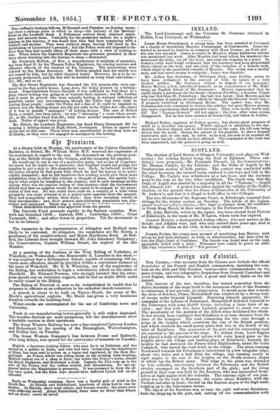Vrotuurm
At a dinner held on Monday, the anniversary of the Colston Charitable Societies, at Bristol, Mr. William Miles M.P. renewed the expression of his sentiments in regard to the war. He descanted on the perilous posi- tion of the British troops in the Crimea, and the necessity for supplies.
He would say it, not as one of a particular party, not as one of a particu- lar creed, but he might say it generally, that England would not grudge her supplies to put a stop to this sanguinary war. Such, he believed, would be the policy adopted by that party with which he had the honour to be parti- cularly connected ; and he felt confident that nothing would give them more satisfaction than to effect this without a thought of place, but merely look- ing to what might be beneficial to the country, and at such meetings as this urging what was the popular feeling of this country that the Government should find that no supplies would be attempted to be stopped in the prose- cution of this war. No war could have come on a country at a time when prosperity was more evinced or at a period more apposite than the present. They had tranquillity within their walls ; they were amassing wealth in their merchandise ; and their general manufacturing population was alto- anther well employed. There was a demaaa far la_ These sentiments wetted loud approval from the guests.
The Patriotic Fund proceeds rapidly in the Eastern counties. Nor- wich has furnished 12001. ; Ipswich, 9001. ; Cambridge, 13001. ; Great Yarmouth, 5001.; and other towns in proportion. Yet the movement is but in its infancy.
The vacancies in the representation of Abingdon and Bedford seem likely to be contested. At Abingdon, the candidates are Mr. Norris, a gentleman of the neighbourhood, and Major Haythorne Reed. At Bed- ford, the Liberals have brought forward Mr. John Sainsbury Trelawney ; the Conservatives, Captain William Stuart, the nephew of the late Member.
At a meeting of the Justices of the West Riding of Yorkshire, at Wakefield, on Wednesday,—the Honourable E. Lasoelles in the chair,— it was resolved that a Reformatory School, capable of containing 100 ju- venile male offenders, should be provided within a convenient distance of the town of Wakefield. Mr. E. B. Whateley, one of the magistrates of the Riding, has undertaken to begin a reformatory school on his estate at Moorfield. Mr. Edmund Denison, who strongly insisted that the enter- prise should rest on voluntary support, said he had no doubt 50001. could be easily raised in the Riding.
The Bishop of Norwich is -now so far reestablished in health that he proposes to officiate at an ordination in his cathedral church tomorrow.
A church is about to be built on Tiptree Heath, the scene of Mr. Mechi's agricultural exploits. Mr. Mechi has given a very handsome donation towards the building-fund.
Water-works are contemplated !or the use of Cambridge town and University.
Trade in our manufacturing towns generally is still rather depressed. The woollen districts are more prosperous, but the manufacturers show a laudable caution in their operations.
The Great Western Railway has now a line completed between London and Birkenhead, by the opening of the Birmingham, Wolverhampton, and Dudley line, on Tuesday.
The Great Western Company's line between Frome and Radstock, after long delays, was opened for the conveyance of minerals on Tuesday.
Mistich, a ferocious-looking fellow, who says he is an Irishman and has served as a soldier in India, and who had been victimizing the inhabitants of Eton, has been sent to prison as a rogue and vagabond, by the Eton Ma- gistratee. As Prince Albert was riding home in the evening from hunting, Mistich rushed out of a shop in Eton, ran before the Prince's horse, abused his Royal Highness, and flourished a stick. Captain Du Plat rode up to the side of the Prince and the ruffian retired, still. threatening. No one ap- peared before the Magistrates to prosecute. It was neoessary to keep the af- fair very quiet, lest the Eton boys should have inflicted Lynch law on the offender.
Early on Wednesday morning, there was a fearful gale of wind in the North Sea. At Shields and Sunderland, hundreds of ships had to run for shelter. At Shields, three went ashore, and became wrecks; the crews were with difficulty saved. About Sunderland, there were no fewer than fifteen sail on shore : crews all saved.


































 Previous page
Previous page